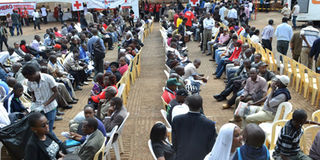Hundreds donate blood to save lives

Thousands of blood donors at Uhuru part on September 23, 2013 where they had gone to donate blood for the Westgate mall victims Photo/JEFF ANGOTE
What you need to know:
- 3,000 units had been donated by on Monday and more is required
- Director says shortage persists and urges more to give vital fluid at Uhuru Park
Hundreds of people flocked Uhuru Park in Nairobi on Monday to donate blood to assist people injured in the terror attack on Westgate Mall.
By 11am, over 3,000 units of blood had been donated since the exercise began countrywide, according to senior deputy director of medical services in charge of emergency services Ibrahim Amira.
HEED THIS CALL
“By yesterday (Monday), Nairobi had collected 1,440 units of blood while the provinces had collected the rest... I would, therefore, like to appeal to as many people as possible to heed this call and donate blood,” he said.
Kenya National Blood Transfusion Services director Margaret Oduor said the donation at Uhuru Park would continue until Friday.
Dr Oduor said the national blood bank had been experiencing serious shortages because Kenyans have not been keen to donate.
“Last year, for example, the National Blood Transfusion Centre in Nairobi collected 158,000 units of blood against requirement of 400,000 units,” she said, adding, the blood expires in a month and therefore continuous donation was required to meet the country’s needs.
“Blood that we usually collect expires after between 35 to 42 days, and that is why we are appealing for people to donate. Usually, a man can donate blood after every three months, while women can do so after every four months.”
Dr Oduor said the emergency donation was being carried out in Nairobi, six regional and 10 satellite centres in the counties.
There are also those will not donate blood for fear that it will make them weak. “This is not the case,” the doctor said.
All donated blood is screened for HIV, Hepatitis B, C and syphilis, and those infected are usually informed and referred for care and treatment.
BODIES TATTOOED
The director said people who had their bodies tattooed recently, those who underwent major surgery, lactating mothers, hypertension patients or people on medication were ineligible to donate blood.
Various leaders, including Nairobi Governor Evans Kidero, County Assembly Speaker Alex ole Magelo and Kenya Women Parliamentary Association members were among the blood donors.
Dr Kidero appealed to psychologists to volunteer counselling services to traumatised victims of the attack.




